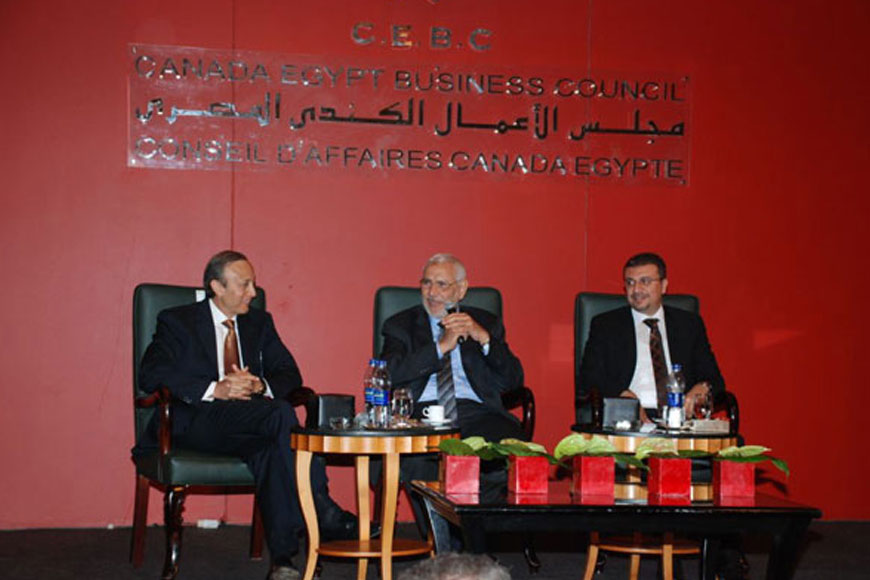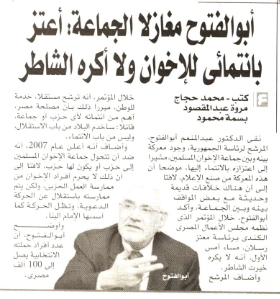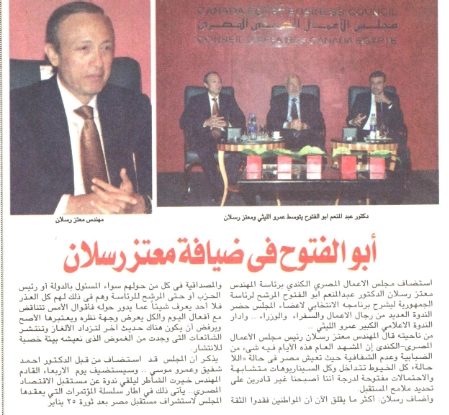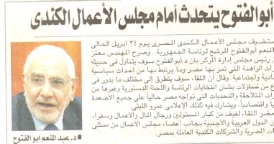
Date
Speaker(s)
Description
The Canada Egypt Business Council (CEBC) hosted its third event in series of meetings with Egypt’s presidential candidates, featuring one of the presidential race’s top contenders, Dr. Abdel Moneim Abolfotoh, who shed light on his presidential electoral program and Egypt’s future agenda. Over 270 distinguished attendees were present at the event representing governmental ministers, ambassadors, CEBC members and guests.
Abolfotoh is famous for confronting former president, Anwar El Sadat, during a debate as the President of Cairo University Student Union. He became part of the Muslim Brotherhood in his youth and was a member of the Guidance Bureau from 1987 and until 2009. He also had a celebrated political career and was the General Secretary of the Doctors Syndicate and General Secretary of the Union of Arab Doctors. He was arrested a number of times for his political activities under the former regimes, in 1981 under Anwar El Sadat’s and again under Mubarak’s, during which he attained a law degree. Worthy to mention is that he is endorsed by moderate and conservative Islamist groups alike, yet not by the mainstream and dominant Islamist group, the Muslim Brotherhood (of which he was part until he quit after choosing to disobey the group’s decision not to field a presidential candidate).
CEBC Chairman, Mr. Motaz Raslan, started his opening remarks for the discussion by criticizing the state of bewilderment and confusion that the Egyptian political scene is delved in the meantime, pointing out the grave problem of trust between the different factions of society, within parties and between the authorities and people. Raslan also spoke of the ambiguity and pessimism that is prevalent in this atmosphere, expressing his deep concern over the reflection of this chaos on the media and how it is playing the role of a catalyst to the confusion. On a brighter note, Raslan drew attention to some key positive events that took place in the previous stage, namely the Supreme Council of Armed Forces’ commitment to hand over power to civil authorities by the end of June 2012 and the ruling on the unconstitutionality of the formation of the constituent assembly, which was unrepresentative of the all factions of Egyptian society.
Amr El Leithy, the Chairman of the Board of Directors of the weekly newspaper “El Khamees” and who is also a professor at the High Institute for Artistic Criticism, the High Institute for Cinema and the International Academy for Mass Communication Sciences, and the winner of the “Best Presenter of a Political Show” award by the Cairo Festival for Radio and Television as well as the “UNESCO” award for developmental mass communication, was sharing the panel with Dr. Abolfotoh. Dr. Abolfotoh started his word in disagreement with what he described as the pessimistic vibe in the title of discussion ‘Where is Egypt Heading?’. He expressed his faith in the Egyptian youth, going back to the first 18 days of the revolution, when in his capacity as a doctor; he was in the morgues, which were overflowing with the dead bodies of the martyrs, “those people, who believed in Egypt and chose to give up their lives for, did not die in vain, the people of Egypt are just great, and will not relent until they see Egypt great”, said Abolfotoh.
“Democracy is the only solution,” Abolfotoh said. He said that all parties are obliged to accept its outcome, even if it does not conform to their will or aspirations, “the Pharaohs era is over and the Egyptians will not give anyone license to rule them as he wishes anymore”, Abolfotoh said. He criticized the current dominant party for wanting to hijack political life and to play all the roles possible in the political arena. He said that while it is their right, as democracy is what brought them the power they possess, however they still should give space for other parties to contribute to the political process taking place.
Abolfotoh criticized dubbing anyone who had a political career in Mubarak’s era to be labeled as ‘feloul’; a word commonly used to describe the remnants of the former president’s corrupt entourage. He stressed on the importance of the legislative body and the necessity of its carrying out of its legislative functions without guardianship from any party, other than the Supreme Constitutional Court’s. He also criticized calls by some to create some Islamic historic bodies, namely, “The Releasing and Binding group” which some political figures proposed. He sees that such bodies have no place in the institutional structure of the modern state and that Muslim and Christian clergy are to be respected. He sees that their role should be to solely guide and disseminate the teachings of both religions.
The presidential candidate then gave an overview of his presidential electoral program in various fields. He spoke of projects in the renewable energy, using sun and wind resources. He mentioned the great potential that lays on the banks the Suez Canal, through which 10% of the world’s trade passes. He also announced that his campaign has prepared extensive reform plans for the ministry of interior and for the fields of education and health care, pinpointing that they are seeking the establishment of high quality educational institutes as well as terminating free higher education.
Answering a question about if becoming the president of Egypt, Abolfotoh announced that he will not advocate progressive taxes, which he thinks repels investors, from his point of view, investment, whether local or foreign, is the economy’s way out of the bottleneck and needs to shift towards adding value.
Abolfotoh commented openly on some key contentious points regarding the constitution. In regards to the army, he sees that 1971 constitution treats the army fairly and that they served Egypt faithfully, while abiding to it and that there is no need to change it. He also said that he believes that Article 2 of the constitution, which stipulates that Sharia law is the main source of legislation, should not be changed. Some are calling for the rulings of Sharia to be the main source of legislation, which prescribes a more rigid application of Sharia. He also called for the inclusion of an article stipulating that Christian religious teachings apply to Christians. He said that while this is implied in the current text, including such an article would reassure the population’s Copts.
After Abolfotoh’s overview of his electoral program, the floor was opened for questions, which covered issues among which were energy and food subsidies, the role of women in society and in Islam, international relations, the Middle East Peace Process, the performance of the Supreme Presidential Elections Commission, media and the role of the ministry of mass communication.




















